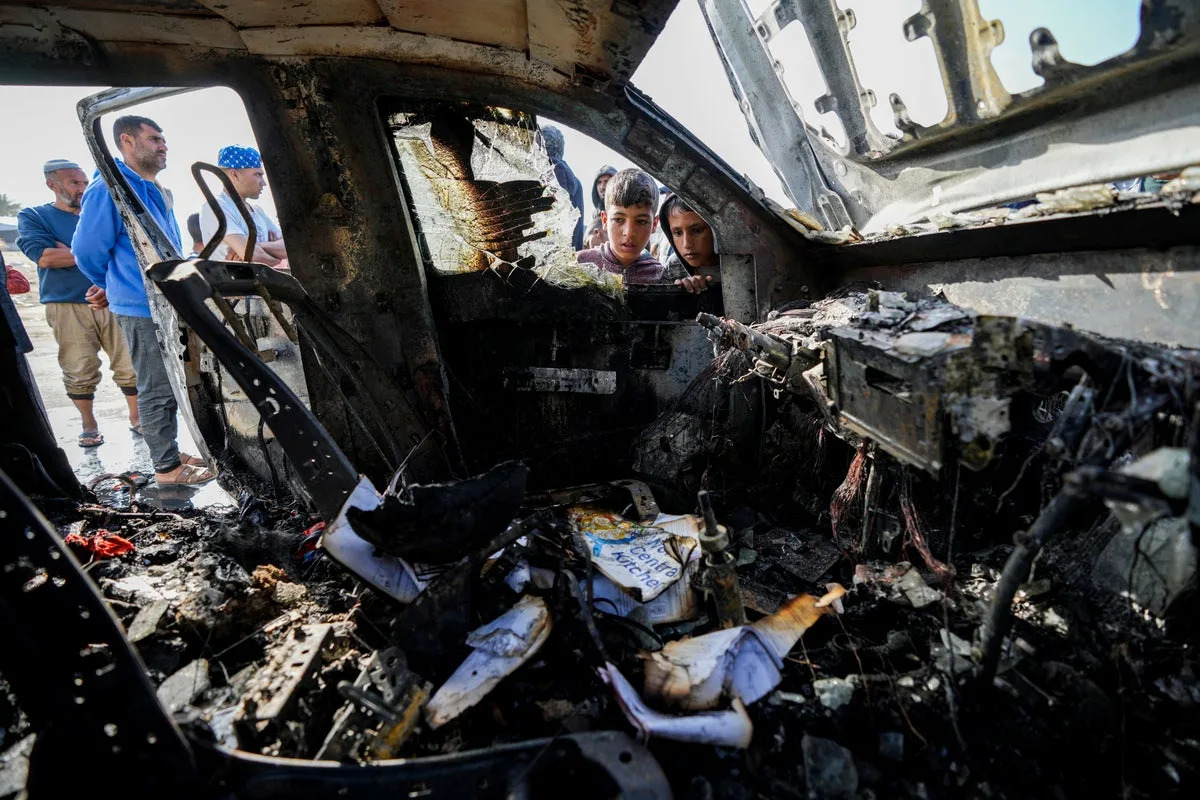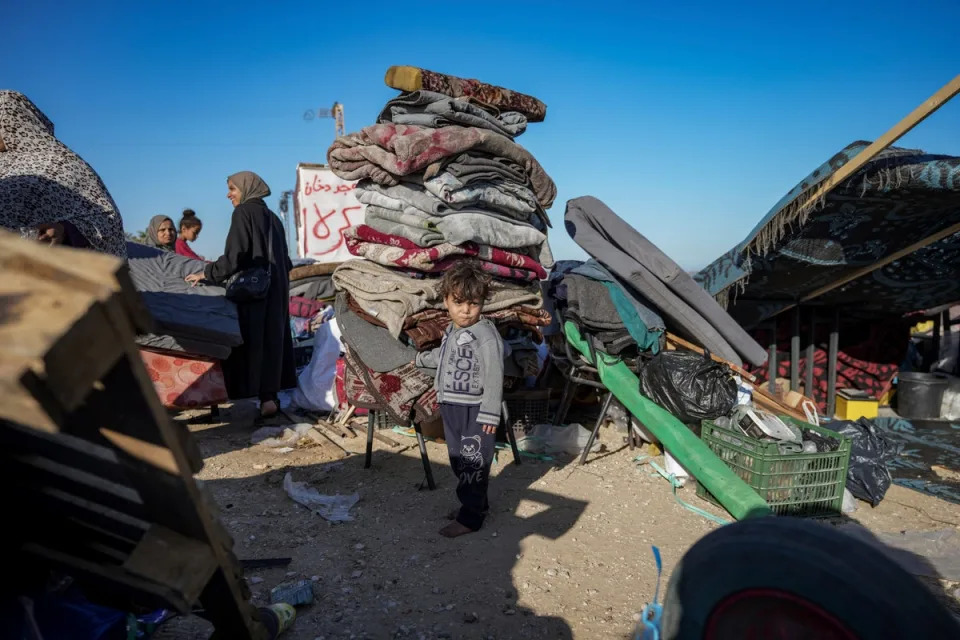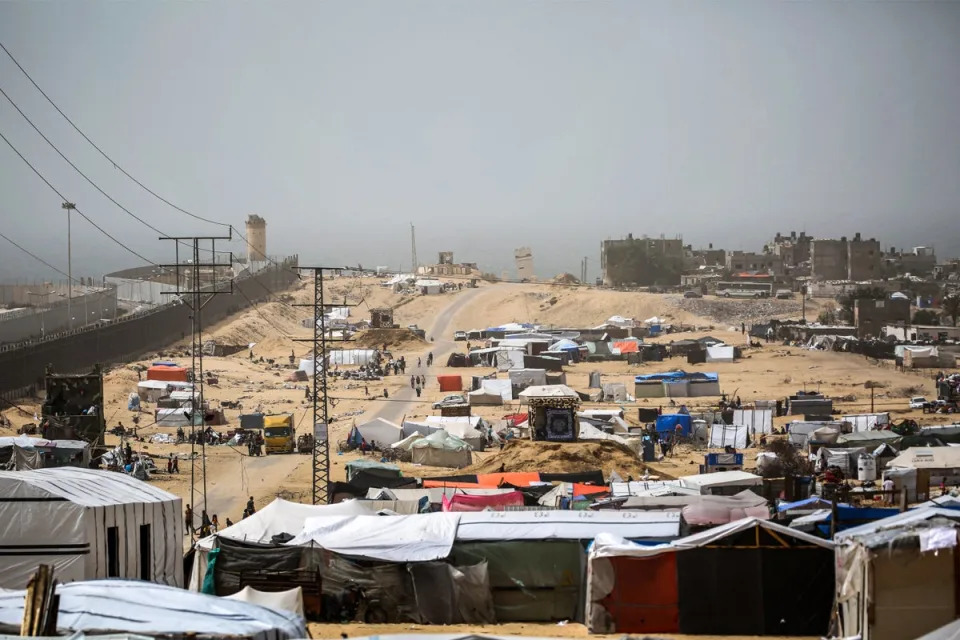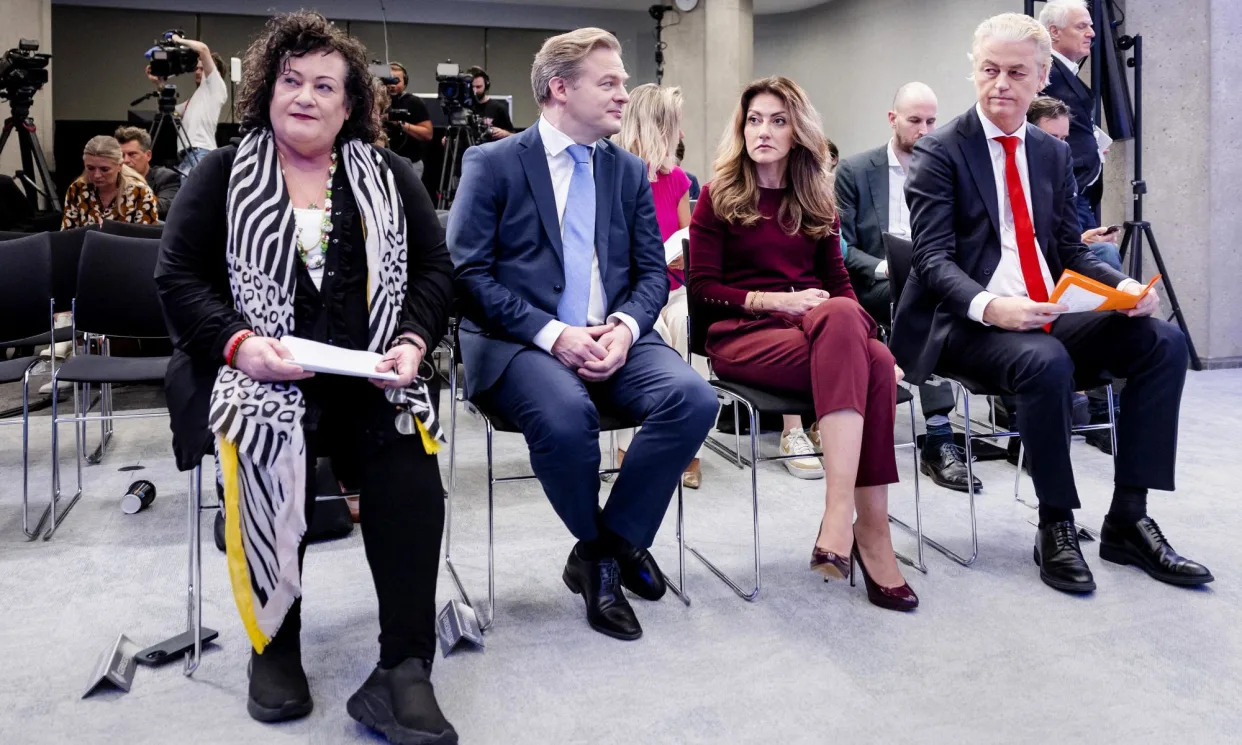UK's Labour sets out plans for government
Peter HUTCHISON
Thu, 16 May 2024

Labour leader Keir Starmer outlined his plan for government (Oli SCARFF)
Britain's main opposition Labour party on Thursday set out its stall for this year's general election with six key pledges to voters in a de facto campaign launch.
The official five-week election campaign only starts when Prime Minister Rishi Sunak names a date. So far, he has only said it will be in the second half of the year.
Nevertheless, both Sunak, who heads the ruling Conservatives, and Labour leader Keir Starmer have switched to campaign mode.
On Monday, Sunak urged voters to keep faith with the Tories even after 14 years in power marked by austerity measures, Brexit, bitter political in-fighting and scandal.
Labour has been consistently polling well ahead of the Conservatives for the last 18 months, putting Starmer on course to become prime minister as the leader of the largest party in parliament.
He laid out Labour's "first steps" for government at an event in Essex, a key battleground area in southeast England.
Starmer promised economic stability, shorter health service waiting times and a new border security command to tackle irregular immigration.
He also vowed to establish a publicly owned clean energy company, crack down on anti-social behaviour with more neighbourhood police and recruit 6,500 new teachers.
"I'm not going to give you gimmicks," said Starmer, who paced the stage in a white shirt, sleeves rolled up.
"There's no quick fix to the mess that the Tories have made of this country. But this is a changed Labour party with a plan to take us forward."
- Labour's 'missions' -
The pledges, largely made before, are intended to add some flesh to the bones of five "missions" Labour says will spur a "decade of national renewal" after four consecutive terms of Tory rule.
Many commentators likened them to the pledge cards brought in by Labour's most successful leader, Tony Blair, whose 10 years as prime minister began with a landslide victory against the Tories in 1997.
They are set to feature on advertising vans and billboards in target constituencies across England in what Labour says is its most expensive ad campaign since the 2019 general election.
At that vote, Labour under the leadership of left-winger Jeremy Corbyn suffered its worst defeat in nearly a century, as Boris Johnson romped home with his promise to "Get Brexit Done".
Starmer, a centrist pro-European former lawyer, has since moved Labour to the centre ground to make the party a more palatable electoral force.
The Conservatives meanwhile have replaced their leader twice, turning on Johnson after his handling of the Covid pandemic and one scandal too many, then forcing out Liz Truss after just 49 days.
Former finance minister Sunak, 44, has sought to repair the damage caused by Truss's disastrous mini-budget of unfunded tax cuts, which spooked financial markets and sank the pound.
But he goes into the election with the Tories' reputation for economic competence tarnished, and riven by ideological splits between moderates and anti-immigration, free market right-wingers.
- 'Tough spending rules' -
Starmer, 61, promised to implement "tough spending rules" to prevent further misery for people who have seen their household budgets squeezed by high inflation and mortgage hikes.
Sunak, who is hoping for better economic conditions by the end of the year, has to hold an election by January 28, 2025. He is using the time to try to keep his party together and revive its fortunes.
On Monday, he warned that Labour would jeopardise UK security, insisting his party could still win the election.
Johnson's predecessor as premier, Theresa May, said Thursday she believed a Labour win "is not a foregone conclusion".
It would require a massive swing to secure a majority, she told reporters, adding that the voters she met were less enthusiastic about Starmer than they were about Blair.
"The view on those doorsteps is different to the feel pre-1997," May insisted.
pdh-phz/jj
Labour Party manifesto 2024: Keir Starmer’s election promises
Amy Gibbons
Thu, 16 May 2024

Labour Party manifesto 2024: Keir Starmer's likely election promises
Sir Keir Starmer has announced the policies at the heart of his election campaign in the clearest indication yet of what we can expect to see in Labour’s 2024 manifesto.
The Labour leader made six key pledges at a campaign rally in Essex, one each on his five “mission” areas – the economy, energy, crime, education and the NHS – plus a newly added priority on immigration.
Sir Keir and Rachel Reeves, his shadow chancellor, are seeking to position Labour as the fiscally responsible party that would drive growth in Britain, allowing them to invest in public services such as the NHS.
Here The Telegraph sets out the pledges the party is expected to include in its general election manifesto.
NHS and social care
Tax
Economy
Environment, energy and net zero
Education and childcare
Defence
Pensions
Policing and crime
Migration
Housing
NHS and social care
Two million more operations, scans and appointments in first year
Train thousands more doctors, nurses and midwives
Specialist mental health support in every school
Extra 700,000 dentist appointments and supervised tooth brushing for three to five-year-olds
New “neighbourhood health centres” with joined-up services
Labour has pledged to get the NHS “back on its feet” by reforming the health service rather than “pouring ever-increasing amounts of money” into it.
As an “immediate priority”, it would focus on tackling the “massive” waiting list backlog, with an extra two million operations, scans and appointments in the first year. This would be achieved by paying NHS staff more to work overtime, boosting availability across evenings and weekends.
These policies formed the basis of Sir Keir’s second key pledge to “cut NHS waiting times with 40,000 more appointments each week, during evenings and weekends.”
In a shake-up of primary care, the party would trial “neighbourhood health centres”, bringing together a wide range of services – including doctors, nurses, care workers and mental health specialists – to cater for millions of patients currently clogging up overloaded A&E units. It would also use spare capacity in the independent sector to speed up treatment.
It has also vowed to “bring back the family doctor” – with GPs paid more for ensuring patients can see the clinician of their choice. Labour has said it would use the NHS App to “end the 8am scramble” for GP appointments and allow patients to book directly for routine checks, while boosting self-referrals and cutting red tape in pharmacies.
It would provide an extra 700,000 urgent dentist appointments each year and introduce supervised tooth brushing in schools for three to five-year-olds, while offering “golden hellos” of £20,000 to newly-qualified dentists who agree to work in areas struggling to recruit.
To tackle the mental health crisis, the party has said it would introduce specialist support in every school and provide an open-access hub for young people in every community.
It would also conduct an assessment of all NHS capital projects to identify any inefficiencies before committing any more money to fixing the “crumbling” estate.
Labour has pledged to double the number of medical school spaces to 15,000, a target also proposed by the NHS and endorsed by the Government, and provide 10,000 extra nursing and midwifery placements.
It would also train an additional 700 district nurses and 5,000 health visitors each year, and recruit 8,500 more mental health professionals.
To boost retention, the party would “consider the case for looking more broadly at how public sector pay is set”. It would also introduce a “targeted scheme” to incentivise senior doctors to stay in work.
Labour has pledged to double the number of state-of-the-art CT and MRI scanners and streamline recruitment for clinical trials.
‘Prevention first’ approach
As part of a “prevention first” approach, it would ban the promotion of junk food to young people and back the Tories’ incremental ban on smoking.
The party would establish fully-funded breakfast clubs in every primary school in England and implement a compulsory “balanced and broad national curriculum with a wide range of physical activities”.
It would also introduce stricter legal targets on air pollution and oversee the retrofitting of millions of homes to help keep them warm and free of damp, while guaranteeing the right to sick pay from day one to minimise the spread of illness in the workplace.
At the same time, Labour would work towards a locally-delivered “National Care Service”.
To tackle staff shortages in social care, it would introduce a “fair pay agreement collectively negotiated across the sector”.
And to raise standards, it would require all providers to demonstrate financial sustainability and responsible tax practices, to value their staff, and to deliver high quality care before they are allowed to receive contracts from local authorities or gain registration from the Care Quality Commission.
It would also give people in care homes a new legal right to see their loved ones and support unpaid carers by offering them paid family carer’s leave.
Labour originally said that much of the health plan would be paid for by abolishing the non-dom tax status but the strategy was thrown into disarray when Jeremy Hunt, the Chancellor, announced the same move at the Spring Budget.
The party has since said it will pay for NHS improvements by going further than the Tories and closing an inheritance tax loophole for non-doms while cracking down on tax avoidance.
Tax
Close inheritance tax loophole for non-doms
Crack down on tax-avoiders
Impose VAT on private school fees
No rise in corporation tax
Overhaul business rates and review tax reliefs
Sir Keir’s first key pledge included a vow to keep taxes “as low as possible”, without committing to specific cuts.
This was broadly in line with Labour’s tax policy to date, which has been vague. However the party has been explicit about a few things.
It had promised to scrap the “non-domiciled” regime, which allows people living in Britain to avoid paying UK tax on money they make overseas for up to 15 years – but this policy has been snatched by the Tories, leaving a hole in Labour’s finances.
The party has since pledged to go further by closing the inheritance tax loophole for non-doms and target tax-avoiders to pay for its spending commitments on schools and the NHS.
Elsewhere, the party would implement 20 per cent VAT on private school fees, with the proceeds funnelled into state education.
Ms Reeves has also promised not to raise corporation tax for the duration of the next Parliament and said she would overhaul the business rates system and review all tax reliefs.
Sir Keir has made clear that he would like to reduce the tax burden on “working people”, while Ms Reeves has hinted at cuts for high earners, vowing to ensure “success is celebrated” under a Labour government.
She has attacked the Tories over their decision to freeze income tax thresholds in the face of rising inflation, but not committed to changing this, insisting it would be “irresponsible” to pledge tax cuts without pinpointing how they would be funded.
Ms Reeves has said she has “no plans” for a wealth tax but the party has explored closing a loophole for second homeowners.
The economy
Bid for highest sustained growth in G7
Tough new fiscal rules and enhanced role for the Office for Budget Responsibility (OBR)
New Office for Value for Money
Invest heavily in green projects
New deal for working people
Sir Keir’s first pledge to keep taxes low was contingent on a promise to “deliver economic stability with tough spending rules, so we can grow our economy”.
This drew on existing policies, with Labour having already set an aim to secure the highest sustained growth in the G7. To do this, it would adopt a new approach it has coined “securonomics”, or “modern supply side economics”.
This would involve bringing in “tough” fiscal rules with a new “enhanced role” for the OBR and establishing a new Office for Value for Money to ensure taxpayer cash is being well spent.
The party originally pledged to invest £28 billion in the drive towards a low-carbon economy every year until 2030 but has since dramatically scaled down the spending plan following sustained criticism from the Conservatives.
The proposals include an £8 billion national wealth fund, which would aim to “unlock billions of pounds of private investment” to support the energy transition.
The party would also reform the planning system to fast-track “priority growth” projects, such as battery factories, labs and 5G infrastructure.
And Labour has vowed to deliver a “new deal for working people”, featuring a “genuine living wage”, a “right to switch off”, a ban on zero hours contracts, and an end to fire and rehire.
Environment, energy and net zero
Clean power by 2030
New publicly-owned energy company
End de-facto ban on onshore wind
Expand windfall tax on oil and gas producers
Upgrade five million homes in five years
Extra £23.7 billion spent on green projects over first term
Labour initially vowed to borrow £28 billion per year from day one to invest in its flagship green prosperity plan.
But this pledge has been significantly watered down over time. Ms Reeves first admitted that the annual sum would not be hit until at least the second half of Labour’s first term.
Then Sir Keir cast further doubt on the scale of the investment, saying it would be subject to the party’s fiscal rules. In a major U-turn, he downgraded the spending commitment to just £4.7 billion a year after admitting it was unaffordable.
Under the new, slimmed down blueprint, public funding for a major home insulation drive was reduced by nearly 80 per cent, from a planned £6 billion a year to just £1.3 billion.
As a result, Labour says only five million houses would benefit from the scheme over the course of five years, compared to the original plan of 19 million across a decade. This is the only project the party has said would be scaled down as a result of the change.
The overarching aim is to turn the UK into a “clean energy superpower”, with a zero-carbon electricity system by 2030. To help achieve this, Labour would set up Great British Energy, a publicly owned body that would invest in green projects like wind farms, with a budget of £1.7 billion a year.
This formed the basis of Sir Keir’s fourth pledge, to “set up Great British Energy, a publicly-owned clean power company, to cut bills for good and boost energy security.”
The new national wealth fund would also put money into gigafactories, clean steel plants, “renewable-ready” ports, green hydrogen and energy storage, with funding of £1.5 billion a year.
The green plan, which now amounts to £23.7 billion over five years, would be on top of £50 billion already committed by the Tories, which Labour has promised to match.
It would be partially funded by expanding the windfall tax on oil and gas producers, which was introduced by Rishi Sunak when he was chancellor to help pay for energy bills support.
Meanwhile, Labour has pledged to overturn the de-facto ban on onshore wind in England, set councils binding targets for how quickly they approve green energy projects, and establish a “British jobs bonus” to incentivise firms to build their supply chains in the UK.
Before it announced the U-turn on the £28 billion fund, the party had claimed the green reforms would take £1,400 off annual household bills and £53 billion off energy bills for businesses by 2030, while creating over a million jobs in 10 years.
Education and childcare
Overhaul childcare system
Delivery of ‘more effective’ Ofsted system
Recruit 6,500 more teachers
Review school curriculum and assessment
New register for children in home education
Reform student loan repayments
Sir Keir’s sixth pledge is focused on education, with the Labour leader vowing to “recruit 6,500 new teachers in key subjects to prepare children for life, work and the future, paid for by ending tax breaks for private schools”.
Labour’s plan for schools also includes scrapping single-word Ofsted judgments and replacing them with “report cards”, and commissioning an expert-led review of curriculum and assessment with an emphasis on “life skills”.
Meanwhile, the party has said it would give the regulator new powers to monitor pupil absence rates and legislate for a new register of children in home education. Elsewhere, it has pledged to overhaul Britain’s childcare system and rethink vocational education.
The aim is to ensure half a million more children hit the early learning goals by 2030, deliver a “sustained rise” in school outcomes over the next decade, and expand “high-quality” training routes.
Labour has yet to confirm its plans for childcare, having commissioned a review by Sir David Bell, the former Ofsted chief inspector, into delivering a more effective system.
It has said it wants to build capacity in the sector but has not specified how it would do this beyond removing “legislative barriers to local authorities opening new childcare provision” and supporting the workforce through high-quality training.
Bridget Phillipson, the shadow education secretary, has previously said she wants to move away from the current free hours model, and twice failed to rule out bringing in changes to means-testing.
But Labour has since welcomed Rishi Sunak’s decision to extend free hours to younger children, suggesting it could keep the existing system in place, at least to start with.
The party has said it will not take away new entitlements granted by the Tories, which include 15 hours of free care per week for two-year-olds.
To support older students, Labour would train more than 1,000 new careers advisers and deliver two weeks of work experience for every young person at secondary school or college.
It would also reform the student loan repayment system to make it “fairer”, with scope for a “month-on-month tax cut” for graduates.
Defence
Boost defence spending to 2.5 per cent of GDP
Commit to Nato and nuclear deterrent
Review defence and security to assess need
Create new armed forces commissioner
If it wins power, Labour would aim to raise defence spending to 2.5 per cent of GDP, matching the Government’s existing target. But Sir Keir has said he will only spend the extra money if it is achievable within the party’s borrowing rules.
Labour has also said it would make an “unshakeable commitment” to Nato and Britain’s nuclear deterrent, in a clear departure from the Corbyn years.
It has pledged a new “triple lock” commitment to build at least four new nuclear submarines at Barrow, keep the continuous at-sea deterrent and fund any future upgrades needed to the fleet.
The party would conduct a review of “strategic defence and security” in its first year to “fully understand the state of our Armed Forces, the nature of threats we face and the capabilities needed”.
And it would legislate to establish an Armed Forces commissioner as a “strong independent voice to improve service life”, while ensuring military homes are fit for purpose.
John Healey, the shadow defence secretary, has also said Labour would shift procurement onto an “urgent operational footing” to support Ukraine and replenish British stocks for any future conflicts.
Pensions
Bring back lifetime cap on pension savings
Commitment to the triple lock
Pensions review to ensure best value for savers
New powers for regulator to tackle under-performing schemes
Labour has said it would bring back the lifetime cap on pension savings abolished by Mr Hunt.
Like the Tories, it has committed to retaining the triple lock, which raises the state pension every year in line with whichever is highest out of wage growth, inflation or 2.5 per cent.
It has also pledged to conduct a review of the pensions system to ensure best value for savers, while giving new powers to the regulator to consolidate schemes where they are under-performing.
Policing and crime
Halve serious violent crime in 10 years
Extra 13,000 bobbies on the beat
Reintroduce strengthened anti-social behaviour orders (Asbos)
Scrap £200 rule on shoplifting
New bravery medal for police killed in line of duty
For his fifth pledge, Sir Keir vowed to “crack down on anti-social behaviour, with more neighbourhood police paid for by ending wasteful contracts, tough new penalties for offenders, and a new network of youth hubs.”
The party has promised to halve serious violent crime and raise confidence in the police and criminal justice system to its highest levels, all within a decade.
Specifically, it wants to halve the level of violence against women and girls and incidents of knife crime.
To protect women and girls, the party would put rape units into every police force and domestic abuse experts in 999 control rooms, as well as specialists in the court system. It would also introduce a new domestic abuse register.
To tackle knife crime, it would put youth workers into A&E departments and custody suites and set up 90 new youth hubs to give teenagers the “best start in life”.
And to raise confidence in the police, Labour has pledged to recruit an extra 13,000 neighbourhood and community support officers. It would also introduce compulsory anti-racism training and a new standards regime.
Meanwhile, the party would reintroduce tougher Asbos with powers to make arrests and force fly-tippers to clean up their mess.
It would also scrap the current £200 threshold to ensure all shoplifting crimes, no matter how small, have to be investigated by police.
And it would introduce a new bravery medal for officers who are killed in the line of duty.
To ensure more criminals are brought to justice, Labour would boost the number of crown prosecutors and force the police to recruit detectives directly from industry.
Migration
Treat people smugglers like terrorists
New cross-border police unit
Extra 1,000 caseworkers to cut asylum backlog
Possible returns deal with EU
Repeal Rwanda Bill
Sir Keir’s third pledge is to “launch a new Border Security Command with hundreds of new specialist investigators, and use counter-terror powers to smash the criminal boat gangs.”
It draws on Labour’s plan to address the small boats crisis, which has two main planks: cracking down on the “vile” people-smuggling gangs, and reducing the asylum backlog.
Sir Keir has also indicated that he would be prepared to do a deal with the EU that would involve taking a quota of migrants who arrive in the bloc in exchange for the ability to return those who illegally cross the Channel to England.
The Labour leader has said he would treat people smugglers like terrorists by giving the National Crime Agency expanded powers to freeze their assets and place restrictions on their movement. He would also work more closely with Europe, creating a new cross-border police unit to “tackle gangs upstream”.
Meanwhile, Labour would recruit more than 1,000 caseworkers to cut the asylum backlog, fast-track decisions on applications from “safe” countries, namely Albania and India, and create a new returns unit, again backed by 1,000 staff, to speed up removals.
The party has vehemently opposed the Rwanda deportation scheme and vowed to repeal it.
But Sir Keir has indicated he would be willing to consider other options to divert migrants abroad. In December, he said he would look at offshore processing, used by countries such as Australia, in a significant hardening of his stance on border controls.
Housing
Build 1.5 million homes
Utilise “poor quality” green belt land
Set home ownership target of 70 per cent
New mortgage guarantee scheme
Labour has pledged to build 1.5 million new homes within its first five years in power, underpinned by a “blitz of planning reform”.
The central policy is to rip up “restrictive” laws to allow construction on “poor quality” green belt land. Dubbed the “grey belt”, this would include areas such as “disused car parks” and “dreary wasteland”.
Labour would also build “the next generation of new towns” across the country, devolve power to local mayors to kick-start development, and give young buyers “first dibs” on new properties in their areas.
Sir Keir has set a home ownership target of 70 per cent and promised to get more people on the housing ladder with a new mortgage guarantee scheme.
The party has also pledged to deliver the biggest boost to affordable housing “in a generation” by strengthening existing rules to prevent developers “wriggling out of their responsibilities”.
Up next
























